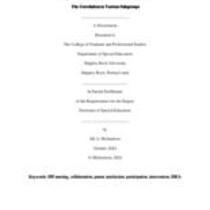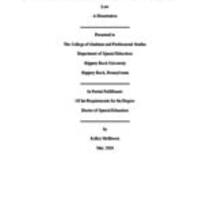- Browse Repository
- Institutional Repository
- United States. Individuals with Disabilities Education Act (x)
- Electronic Theses and Dissertations
- Title
- Improving parent collaboration at IEP meetings
- Abstract
-
An Individual Education Program (IEP) is a critical document that drives decisions about educational support and services for students with a disability. It is imperative that parents have a role in the development of their child’s IEP through a collaborative process...
Show moreAn Individual Education Program (IEP) is a critical document that drives decisions about educational support and services for students with a disability. It is imperative that parents have a role in the development of their child’s IEP through a collaborative process. This study examines the correlations between various subgroups and the level of satisfaction of a collaborative IEP meeting. In this qualitative study, a digital survey is used to gain feedback from 29 parents of students from preschool through twelfth grade receiving special education services. Findings reveal that parents expressed overall satisfaction with the level of collaboration at IEP meetings with relatively positive satisfactory ratings consistent through each survey question. Survey data was then correlated with four subgroups; grade level, disability category, number of IEP meetings attended, and race/ethnicity. Themes emerged from synthesizing the data specific to four subgroups that included variations in the data. As part of the study, participants provided suggestions for improving collaboration at IEP meetings. Parents expressed a desire for improved communication, opportunity to provide feedback, and improved agenda for IEP meetings. In contrast, some challenges were noted by some parents that limit parental engagement. The importance of this data can potentially impact the effectiveness of IEP meetings and improve student outcomes. A consideration for future research could explore the impact of the recommended interventions, change of district policies, and generalization across other school districts.
Show less - Year Issued
- 2024
- Author
- Michaelson, Jill
- Sub-title
- The correlation to various subgroups
- Title
- K-12 General educator and special educator knowledge and preparedness in special education law
- Year Issued
- 2024
- Abstract
-
Together, the Individuals with Disabilities Education Act and Section 504 of the Rehabilitation Act protect students with disabilities from discrimination and ensure that services are received in order to access the general education curriculum. K-12 general educatio...
Show moreTogether, the Individuals with Disabilities Education Act and Section 504 of the Rehabilitation Act protect students with disabilities from discrimination and ensure that services are received in order to access the general education curriculum. K-12 general education teachers and special education teachers are among the most critical individuals in implementing the federal laws that protect students with disabilities in the school setting. Despite the shift to inclusive practices that is safeguarded by extensive procedures subject to litigation, past research has revealed a gap between educator knowledge and preparedness to implement special education law in the classroom. The purpose of the research was to answer the research questions, “What undergraduate preparation and professional development training do K-12 general educators and special educators receive regarding IDEA and Section 504 of the Rehabilitation Act, in one public school district?” and “To what extent are K-12 general education and special education teachers familiar with the Individuals with Disabilities Education Act and Section 504 of the Rehabilitation Act, in one public school district?” To obtain this information, a qualitative study was conducted consisting of a 10-question open-ended survey which was distributed to 10 general education teachers and 10 special education teachers in one public school district. Survey data was analyzed using an open-coding method. Three major findings emerged from the data and were categorized into themes. Theme one concluded that educator’s obtain knowledge of IDEA and Section 504 mainly by means of professional development and through a district administrator. Secondly, educators identify the main components of IDEA as being FAPE, LRE, IEPs, and parental involvement. The tertiary theme revealed educator’s identify the main component of Section 504 to be protection from discrimination for students with disabilities. Findings suggest that teachers may receive more training and coursework geared towards The Individuals with Disabilities Education Act when compared to Section 504 of the Rehabilitation Act. Additionally, years of experience seemed to have little impact on knowledge and preparedness pertaining to special education federal law.
Show less - Author
- McBroom, Kelley


